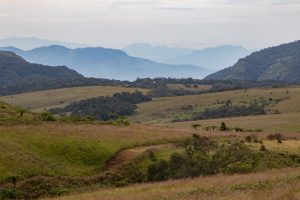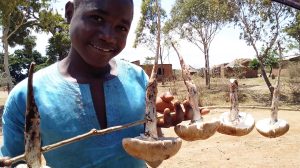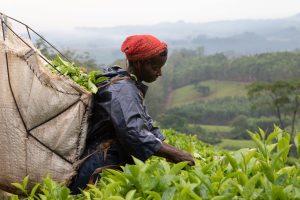Bringing the cedar back: Myriad Canada and WeForest are restoring landscape on Malawi’s Mount Mulanje
Myriad Canada’s project with WeForest supports the protection and restoration of the critically endangered Mulanje cedar, working with local communities to ensure the future of the fantastically diverse region and its people
Mount Mulanje in southern Malawi is often called the “Island in the Sky,” a reference to the extraordinary diversity of its plants and animals. Long a source of water, wood and cultural significance for the communities living in the shadow of its granite peaks, the mountain is home to Malawi’s national tree, the Mulanje cedar. It is only place in the world where it grows, and there are only two left.
These two mature specimens, however, are joined by hundreds of thousands of saplings – of cedar and other endemic species – planted by locals working for and with WeForest. The Brussels-based NGO is a few years into the 10-year Mount Mulanje project, a landscape restoration project within the larger Miombo Belt Regeneration Programme.
Mulanje is located within the Miombo woodland biome that stretches across Central and Southern Africa. “We are a front-line climate organization,” explains Dave Bircher, Director of Growth at WeForest. “We are focused on protecting and restoring overlooked ecosystems that are biodiversity hotspots.”
Valuable wood for consumers
Despite being an officially protected nature reserve since the 1920s, Mount Mulanje has been heavily deforested, both by legal and illegal logging activity. Cedar is prized for its versatility in the building and woodworking industry, while hardwood species in the forest are perfect for producing charcoal.
“We realized that because the Miombo around the mountain was already so deforested, people were moving into the actual biosphere reserve where there are all these endemic species,” says Bircher. “We’re focused on the communities and the Miombo on the slopes of the mountain first, to bring those back and protect what’s still there.”
The project is generously supported by a donor-advised fund of USD 78,000. The Mount Mulanje project takes in some 75,000 hectares of landscape and nearly two millions trees that will be protected or planted. Like with all WeForest projects, it started with rigorous groundwork.
 |
 |
 |
 |
‘Hands in the soil’
“One of the most important things that we do as a science-based organization is baseline studies,” says Bircher. “There’s a social and an economic baseline study that we do with communities… Then we also do an ecological baseline assessment. That is around forest degradation, wildfires, all sorts of different things. That’s how we are able to track our impact and progress along the way.”
Community leadership is essential to WeForest’s work – their projects are spearheaded by local staff, volunteers and partners. “What sets us a bit apart as an NGO is that we are the direct implementors of most of our projects. We say we are ‘hands in the soil’. So 75% of our staff is not based in Europe but in our country offices and in our projects.”
This means that once the project is officially complete, there are still locals carrying out the work required to continue protecting and nurturing the landscape. “Our teams on the ground are Malawian, so they are always going to be there,” Bircher says.
Women-led nurseries
Among the local leaders helping to guide this transformation is Fanny Napanga of the Makolera Cedar Nursery in Phalombe. Her nursery – one of several women-led co-ops established as part of the project – grows cedar seedlings and plants them in the slopes of Mount Mulanje. “This tree is the future for our children,” Napanga told Awim News. “If we don’t sacrifice to take care of the environment now, our children will have a hard life.”
The nurseries are part of a growing network of community and governmental efforts focused not only on planting trees but on reshaping the relationship between people and forests. This includes training and education programmes to emphasize the long-term effects of deforestation on soil health, water cycles and agriculture. Together with community partners, WeForest has trained nearly 2,500 people in sustainable land-use practices, including more than 60 beekeepers, who now tend 200 new hives.
Very often, explains Bircher, “forests are the most important assets of the communities living in and around them. When forests are degraded, there’s less rainfall, there’s fewer products that can be harvested, there’s no wood left for fuel. Its about survival, food security, people providing for their families. In a lot of places we work, without a forest, that’s not really possible.”
Support this project through Myriad’s forest restoration fund

